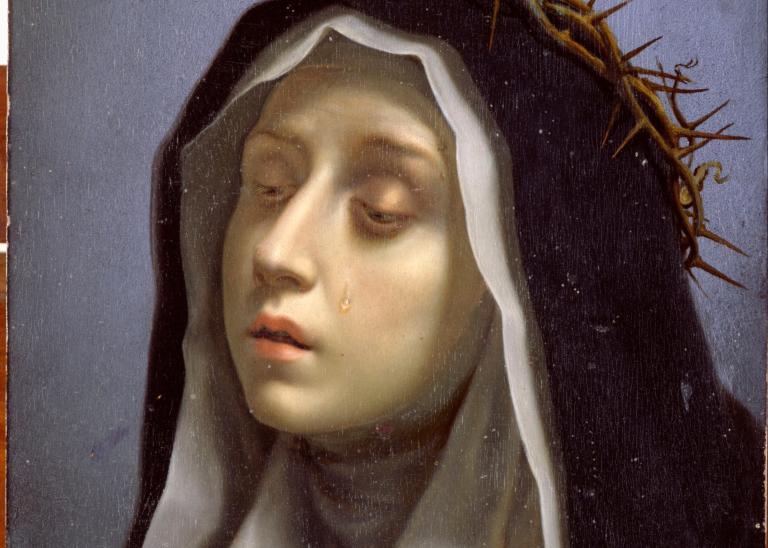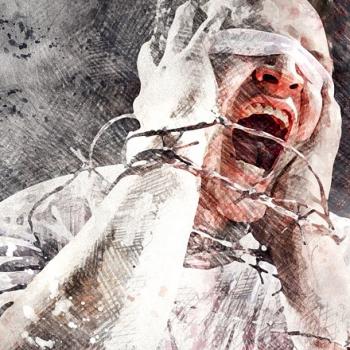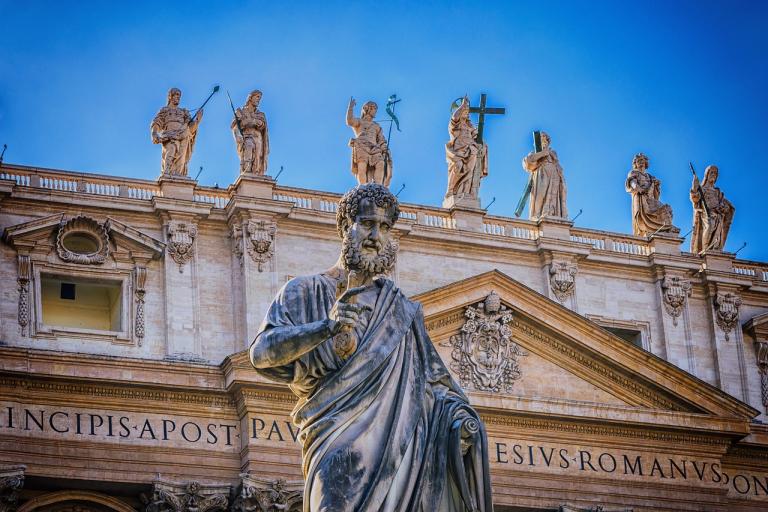St. Catherine of Siena, by Guido Reni
I am just going to leave these here. The clarity of faithful Catholics like Cardinal Newman, St. Catherine of Siena, and Pope St. Pius X speaks for itself. (I do, however, include some emphases and comments of my own.)
- Blessed John Cardinal Newman.
[W]hat need I say more to measure our own duty to it and to him who sits in it, than to say that in his administration of Christ’s kingdom, in his religious acts, we must never oppose his will, or dispute his word, or criticise his policy, or shrink from his side? There are kings of the earth who have despotic authority, which their subjects obey indeed but disown in their hearts; but we must never murmur at that absolute rule which the Sovereign Pontiff has over us, because it is given to him by Christ, and, in obeying him, we are obeying his Lord.
[“Absolute rule”? We must never murmur or dispute his word? Never criticize his policy? That’s extreme. Sounds like Ultramontanism!]
We must never suffer ourselves to doubt, that, in his government of the Church, he is guided by an intelligence more than human. His yoke is the yoke of Christ, he has the responsibility of his own acts, not we; and to his Lord must he render account, not to us. Even in secular matters it is ever safe to be on his side, dangerous to be on the side of his enemies.
[“Even in secular matters”: Which means Newman will have none of this “we don’t have to listen to the pope except on faith and morals” nonsense.]
Our duty is—not indeed to mix up Christ’s Vicar with this or that party of men, because he in his high station is above all parties—but to look at his formal deeds, and to follow him whither he goeth, and never to desert him, however we may be tried, but to defend him at all hazards, and against all comers, as a son would a father, and as a wife a husband, knowing that his cause is the cause of God. And so, as regards his successors, if we live to see them; it is our duty to give them in like manner our dutiful allegiance and our unfeigned service, and to follow them also whithersoever they go. (“Our Obligations to the Holy See,” 1866)
- St. Catherine of Siena.
He is insane [St. Catherine did not mince words.] who rises or acts contrary to this Vicar who holds the keys of the blood of Christ crucified. Even if he was a demon incarnate, I should not raise my head against him, but always grovel and ask for the blood out of mercy.
Even if he was a demon, says St. Catherine. Even then I would grovel. She speaks strong words.
And don’t pay attention to what the demon [She means the actual demon, Satan; not the pope.] proposes to you and you propose under the color of virtue, that is to say to want to do justice against evil pastors regarding their fault. Don’t trust the demon. Don’t try to do justice about what does not concern you.
[Mind your own damn business, says St. Catherine. Who do you think you are?]
God wants neither you nor anyone else to set themselves up as a righter of the wrongs of His ministers. He reserves judgment to Himself, and He reserves it to His Vicar; and if the Vicar does not do justice, we should wait for the punishment and correction on the part of the sovereign judge, God Eternal. (Letters, Vol. I. Letter No. 28).
St. Catherine had more to say on this theme on other occasions.
He left you this sweet key of obedience. [Obedience is one of the counsels, but it is for the laity too.] For as you know He left His vicar, the Christ, on earth, whom you are all obliged to obey until death, and whoever is outside His obedience is in a state of damnation. (Dialogue, Treatise on Obedience)
And here is one more from St. Catherine.
[D]ivine obedience never prevents us from obedience to the Holy Father. Nay, the more perfect the one, the more perfect is the other. And we ought always to be subject to his commands and obedient unto death. However indiscreet obedience to him might seem, and however it should deprive us of mental peace and consolation, we ought to obey; and I consider that to do the opposite is a great imperfection, and deceit of the devil. (Letter to Brother Antonio of Nizza)
When a Doctor of the Church says your rebellion is a “decit of the devil,” you should listen. You should take counsel.
- Pope St. Pius X.
It seems incredible, and is even painful, that there be priests to whom this recommendation must be made, but we are regrettably in our age in this hard, unhappy, situation of having to tell priests: love the Pope!
[Nothing new under the sun. That’s where we are still, in our own age.]
And how must the Pope be loved? Non verbo neque lingua, sed opere et veritate. [Not in word, nor in tongue, but in deed, and in truth – 1 Jn iii, 18] When one loves a person, one tries to adhere in everything to his thoughts, to fulfill his will, to perform his wishes. And if Our Lord Jesus Christ said of Himself, “si quis diligit me, sermonem meum servabit,” [if any one love me, he will keep my word – Jn xiv, 23] therefore, in order to demonstrate our love for the Pope, it is necessary to obey him.
[It is not optional. It is the duty of a Catholic.]
Therefore, when we love the Pope, there are no discussions regarding what he orders or demands, or up to what point obedience must go, and in what things he is to be obeyed; when we love the Pope, we do not say that he has not spoken clearly enough [I love that part. We are not to quibble over his words, or whether this or that is infallible.]almost as if he were forced to repeat to the ear of each one the will clearly expressed so many times not only in person, but with letters and other public documents; we do not place his orders in doubt, adding the facile pretext of those unwilling to obey – that it is not the Pope who commands, but those who surround him; we do not limit the field in which he might and must exercise his authority.
[Just so. None of this, “Well, the pope is almost never infallible, so I almost never have to listen to him.” Pius X will have none of that.]
[W]e do not set above the authority of the Pope that of other persons, however learned, who dissent from the Pope, who, even though learned, are not holy, because whoever is holy cannot dissent from the Pope.
This is the cry of a heart filled with pain, that with deep sadness I express, not for your sake, dear brothers, but to deplore, with you, the conduct of so many priests, who not only allow themselves to debate and criticize the wishes of the Pope, but are not embarrassed to reach shameless and blatant disobedience, with so much scandal for the good and with so great damage to souls.
(Our good friends at Rorate Cæli promoted Pius’s words—that debate and criticism of the pope causes scandal and damage to souls. They did that, of course, when Benedict XVI was pope.)













